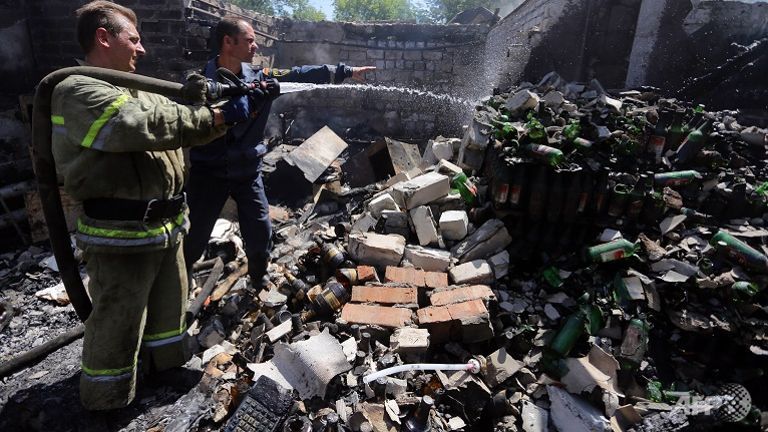Four killed as new Ukraine peace talks fall apart
 |
| Firefighters extinguish a fire at a food storage unit destroyed as a result of shelling between Ukrainian forces and pro-Russian separatists in the town of Gorlivka, Donetsk region. (AFP PHOTO/ALEKSEY FILIPPOV) |
KIEV: Ukraine on Monday (Aug 3) reported the death of four soldiers in clashes with pro-Russian rebels that came just hours before another failed bid to negotiate an end to the 15-month separatist revolt.
Military spokesman Andriy Lysenko said another 15 servicemen had been wounded in the past 24 hours of fighting across the eastern Russian-speaking provinces of Lugansk and Donetsk. "The first week of August ... has been very tense," Lysenko told reporters.
The insurgents countered that indiscriminate shelling by Kiev's forces had damaged power lines and four buildings in Gorlivka - a rebel bastion more than 30 kilometres northeast of their de facto capital Donetsk. The local village council said it was checking whether any civilians were killed in the reported attack.
The incessant exchanges of fire and mutual accusations of responsibility have frustrated Western efforts to resolve Europe's bloodiest and most protracted conflict since the Balkans crises of the 1990s.
The warring sides and Russia on Monday launched another round of European-mediated negotiations in the Belarussian capital Minsk that seek to salvage a sweeping but largely ineffective ceasefire and political reconciliation agreement signed nearly six months ago.
The latest meetings were meant to agree the withdrawal of smaller weapons from a proposed 30-kilometre-wide buffer zone that splits rebel-run districts from the rest of Ukraine.
Donetsk separatist negotiator Denis Pushilin said the discussions were "aborted by the Ukrainian side" after more than six hours because of Kiev's refusal to move back its forces from four strategic locations.
Pushilin added that some talks would continue into Tuesday. "But most likely, nothing will get done," he said. Kiev and Moscow envoys did not speak to reporters in Minsk.
More than 6,800 people have died and at least another 1.4 million have been left homeless by a revolt that began across Ukraine's industrial heartland in the wake of the February 2014 ouster in Kiev of a Moscow-backed president.
The resulting war has both crippled the ex-Soviet state's economy and chilled Western relations with Russian President Vladimir Putin - a veteran strongman who is increasingly isolated abroad but still rejecting charges of fomenting his southwestern neighbour's war.
POROSHENKO UNDER PRESSURE
Ukrainian President Petro Poroshenko and his foreign allies believe that Putin does not necessarily want to annex the two rebellious regions in the same way he seized the Black Sea peninsula of Crimea in March 2014. But they do think the Kremlin is trying to keep Kiev politically off-balance and forced to finance a military operation it can ill afford.
Some analysts believe that the situation is being mitigated somewhat by enduring diplomatic efforts to avert a "frozen conflict" that keeps the EU's eastern frontier on security alert for decades to come.
The Minsk II pact agreed in February was sealed only after all-night talks between Putin and Poroshenko that were attended by German Chancellor Angela Merkel and French President Francois Hollande.
The two European leaders see no alternative to the Minsk solution and insist on its full implementation by the end of the year. But Kiev and the combatants have radically different readings of what that document says.
Poroshenko has been under pressure to back the extended buffer zone idea from both Merkel and Hollande. Yet several hundred residents of the Kiev-controlled frontline port of Mariupol - whose eastern outskirts have been targeted by insurgent shells - rallied against the pullback on Sunday out of fear that it would only provoke a new rebel advance.
It also remains highly doubtful that any new demilitarisation agreement would have any real affect on the ground.
Monitors from the Organisation for Security and Co-operation in Europe (OSCE) have for weeks observed the deadliest exchanges involving heavy tanks and powerful rockets that should have been withdrawn months ago.
What the stars mean:
★ Poor ★ ★ Promising ★★★ Good ★★★★ Very good ★★★★★ Exceptional
Latest News
More News
- Russian President congratulates Vietnamese Party leader during phone talks (January 25, 2026 | 09:58)
- Worldwide congratulations underscore confidence in Vietnam’s 14th Party Congress (January 23, 2026 | 09:02)
- Political parties, organisations, int’l friends send congratulations to 14th National Party Congress (January 22, 2026 | 09:33)
- 14th National Party Congress: Japanese media highlight Vietnam’s growth targets (January 21, 2026 | 09:46)
- 14th National Party Congress: Driving force for Vietnam to continue renewal, innovation, breakthroughs (January 21, 2026 | 09:42)
- Vietnam remains spiritual support for progressive forces: Colombian party leader (January 21, 2026 | 08:00)
- Int'l media provides large coverage of 14th National Party Congress's first working day (January 20, 2026 | 09:09)
- Vietnamese firms win top honours at ASEAN Digital Awards (January 16, 2026 | 16:45)
- ASEAN Digital Ministers' Meeting opens in Hanoi (January 15, 2026 | 15:33)
- ASEAN economies move up the global chip value chain (December 09, 2025 | 13:32)
















 Mobile Version
Mobile Version